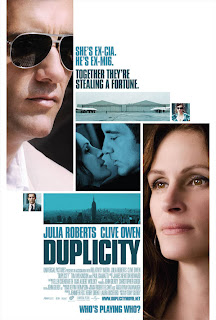 Duplicity (2009). Written and directed by Tony Gilroy. Starring Julia Roberts and Clive Owen. Excellent supporting roles by Tom Wilkinson and Paul Giamatti.
Duplicity (2009). Written and directed by Tony Gilroy. Starring Julia Roberts and Clive Owen. Excellent supporting roles by Tom Wilkinson and Paul Giamatti.
I saw Duplicity in the theaters last month in part because of the positive reviews paired with skeptical press and questions about whether Julia Roberts could still open a movie.  (Questions that angered me enough to express my opinion with my wallet, an action I believe is important.) A recent story clip on MSN compelled me to revisit the movie. The headline “Moneymakers” beside a picture of Julia Roberts, with the byline “Hollywood’s most bankable actresses” links to an article that discusses which actresses can currently be counted on to bring in the bucks. “Moneymaker”, of course, is a term most commonly associated with pornography, prostitution, and the objectification of the female ass, in particular.
(Questions that angered me enough to express my opinion with my wallet, an action I believe is important.) A recent story clip on MSN compelled me to revisit the movie. The headline “Moneymakers” beside a picture of Julia Roberts, with the byline “Hollywood’s most bankable actresses” links to an article that discusses which actresses can currently be counted on to bring in the bucks. “Moneymaker”, of course, is a term most commonly associated with pornography, prostitution, and the objectification of the female ass, in particular.
The actress-as-commodity isn’t anything unusual in the sexist institution of mainstream filmmaking, but describing a popular actress as a “moneymaker” creates a serious problem. While box office numbers (and particularly opening weekend numbers) determine a film’s success and influence executives in terms of which movies are greenlighted, I have to wonder if it’s the actress’ ass alone bringing people into theaters.
Anyhow, on to the movie.
Duplicity expects level of sophistication and intelligence from its audience, which includes the ability to follow a story that jerks viewers from location to location, and from time to time. It’s a romantic comedy, but it makes you think. Maybe this is a problem for box-office bucks, but a little mental effort makes a movie much more enjoyable–for adults, at least.
Thinking about Ripley’s Rule as a litmus test, this movie actually barely passes–if at all. This fact ordinarily is a big problem for me, but in Duplicity it feels like an afterthought. It’s a romantic comedy, but not the kind we’ve become accustomed to.  As a number of reviewers have previously mentioned, this film hearkens back to the screwball comedies of the 1940s, when wit was king, and the women generally matched the men in smarts (that’s not to say that the gender politics were a mess in those movies). What makes the movie good–and so different from other romantic comedies–is that the man and woman are on an even keel. Domination of one or the other sex isn’t the issue. These characters have bigger fish to fry–namely, their bosses in the world of corporate espionage. It’s as if Michael Clayton were remade into a romantic comedy.
As a number of reviewers have previously mentioned, this film hearkens back to the screwball comedies of the 1940s, when wit was king, and the women generally matched the men in smarts (that’s not to say that the gender politics were a mess in those movies). What makes the movie good–and so different from other romantic comedies–is that the man and woman are on an even keel. Domination of one or the other sex isn’t the issue. These characters have bigger fish to fry–namely, their bosses in the world of corporate espionage. It’s as if Michael Clayton were remade into a romantic comedy.
If you aren’t convinced that the movie is worth seeing, the opening credits present the strangest and most hilarious fight scene in recent memory.
Here’s the trailer:

I liked the movie, despite its utter failure of Ripley’s Rule/Bechdel Test (Julia Roberts only talks to one other woman, and what they talk about is Julia Roberts’ man cheating on her with the other woman. I think there’s a moment where Julia Roberts is addressing a group of people that includes another woman, but again, she’s talking about her male co-star). It’s fast-paced and fun and not predictable.
I’m right with you, Jess. That conversation was the only one between two women, and I remember the dismay I felt when the whole thing was about how special he made her feel, blah blah. I couldn’t remember if there was, perhaps, a word or two exchanged between Roberts’ character and the other female spy.
Duplicity marks yet another example of how Gilroy packs ideological and social critique within traditional Hollywood generic films (e.g. the action films of the Bourne trilogy as critique of the “American Empire,” etc.).
As far as a feminist reading goes, I think it’s pertinent that Gilroy would not shoot this film until Roberts agreed to star in it. He needed the quintessential romantic comedy actress of our time, the one we often associate with the horrid fairy-tale Pretty Woman, to play a part that undermines this traditional role. Roberts, who plays a double-agent, acts like a romantic comedy flake (of the recent Hollywood variety, not the 40s wit) to lure her victim, Owen, so she can ruthlessly carry out her objective. Owen then spends the rest of the movie trying to figure out the real Roberts. Is she his lover or his rival? When she gives that golden Robert’s smile, does she do so genuinely or is she putting him on?
By starring Roberts, Gilroy undermines the flaky, insecure, I-need-a-man, romantic comedy “heroine,” and restores the witty, independent, I-can-love-you-or-leave-you-either-way-I’ll-be-fine heroine of bygone years. Roberts can be Owen’s passionate lover and intellectual rival. These roles need not be mutually exclusive, and when the two lovers match wits and pull their resources together they may even be able to take on the world…well, not quite.